1110 Search Results for Core
March 13, 2016
by Carole Zangari -
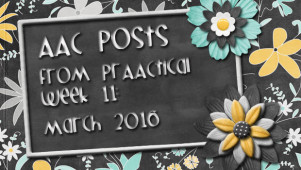
Let’s make this a great week for AAC collaboration, support, and sharing. Monday – PrAACtical Site of the Month: Loudoun County Public Schools AT Team Wednesday – Video of the Week: Infusing AAC Core Vocabulary into Interactive Storybook Reading Thursday – Learning About Augmentative Communication Empowerment and Support (ACES)
March 6, 2016
by Carole Zangari -
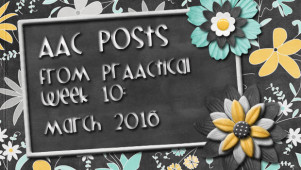
Hope you’ve had a productive week of AAC teaching and learning. Monday – PrAACtically March: AAC Core Vocabulary Resources Wednesday – Video of the Week: Scaffoldingand Anchoring Thursday – PrAACtical Resources: AAC Partner Strategies Handout Not too old, not too young. Not too intellectually impaired or gifted. Not too motorically limited or talented. Everyone deserves a voice.
February 25, 2016
by Carole Zangari -
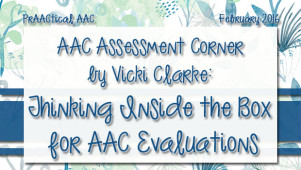
AAC assessment is a challenge in almost every service delivery setting, and many of you have reached out to us to ask for advice on how to strengthen your assessment practices. Luckily, Vicki Clarke, an AAC Chick who has a great deal of experience assessing learners in clinical and educational settings, has tips and resources to share. In this continuation of the AAC Assessment Corner series, Vicki talks about a key feature in any AAC system: vocabulary organization. ::::::::::::::::::::::::::::::::::::::::::::::::::::::::::::::::::::::::::::::::::::::::::::: Thinking Inside the Box for AAC Evaluations: What Type of Vocabulary Organization is Right For Your AAC User? Professionals often spend a great deal of time concerning themselves with which box they should get their AAC user. Should I pick a Prentke Romich or a Tobii Dynavox? But what about the iPad? And what about the money? Should I pick a CheapTalk or a GoTalk instead? Here’s the good news: The box is not the... [Read More...]
February 15, 2016
by Carole Zangari -
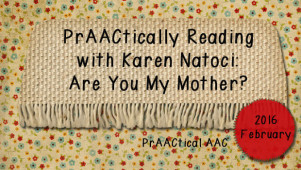
We get many requests to do more posts on providing AAC supports to children who use alternative access. Karen Natoci must have read my mind when she wrote this month’s PrAACtically Reading post because she gave us lots of ideas for shared reading with a child who is learning to use eye gaze for communication. The book that she chose is a P.D. Eastman classic that many of us remember from our own childhoods. Happy reading! Shared Reading Using Eye Gaze Book: Are You My Mother? by P.D. Eastman CORE Words to practice using: you, want, where, look, more, no, go, like, oh no! mine FRINGE Words to practice using: Animal names, mother, snort!! I am happy to share this lesson plan to describe the integration of early eye gaze and switch use to foster engagement while reading the delightful book, Are you My Mother? (authored by P.D. Eastman). Today, I chose... [Read More...]
January 31, 2016
by Carole Zangari -
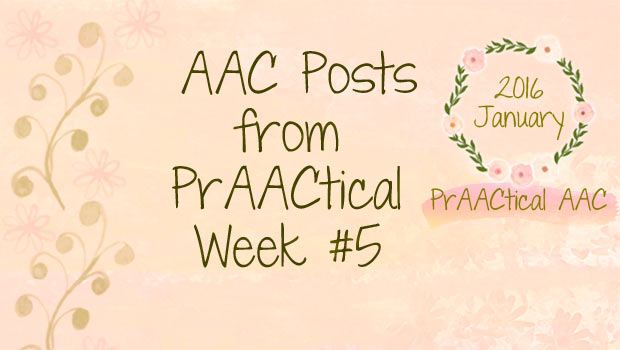
Between the start of new semester, conferences, and a bit of crazy weather, January has been a busy month. Here are a few posts from our prAACtical week that may be of interest. Monday – AAC and the IEP: 5 Resources to Explore Wednesday – Video of the Week: Helping Learners Build Self Regulation Skills Thursday – PrAACtically February: Resources for A Year of Core Vocabulary Words
January 24, 2016
by Carole Zangari -
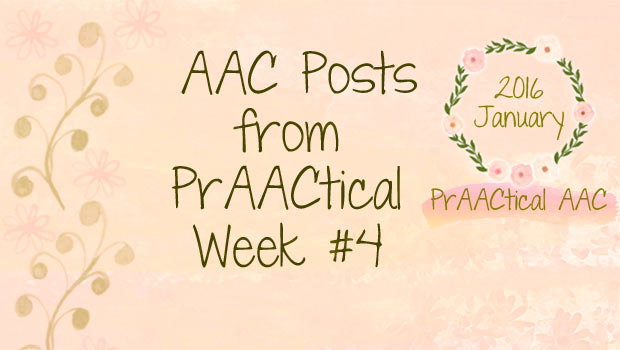
Here are some posts that you may have missed in your busy week. Monday – PrAACtically Reading: A House for Hermit Crab Tuesday – PrAACtical Ideas: AAC Core Vocabulary Practice for Workshop and Inservice Training Thursday – Video of the Week: Documenting AT in the IEP Thanks for all you do to support children and adults with little or no functional speech.
January 18, 2016
by Carole Zangari -
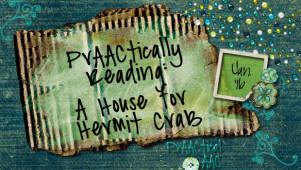
Storybook reading is rich with potential for building AAC, language, and literacy skills. An added bonus: It’s an activity that educators, therapists, and families can all use and enjoy. In this post, we explore ways to use A House for Hermit Crab, by Eric Carle, for AAC and language learning. Key Instructional Strategies Having an engaging book gives us a good start on the lesson, but the learning comes from the interaction. Shared reading can be done in therapy one-on-one or as a group in class. Either way, the adult leading the activity will need to be well-versed in instructional strategies that facilitate AAC learning. These include: Aided language input RAAP Feedback Goal Areas: Language and Communication There are lots and lots of ways to use this book for literacy learning, but in this post we’ll focus more on the development of communication and language skills. Here are some goal... [Read More...]
January 10, 2016
by Carole Zangari -
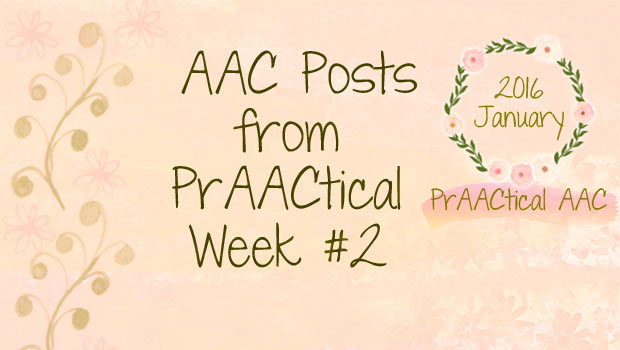
The New Year is a perfect time to give your clinical and educational practices a boost of AAC. Here are some posts from the past week that may be useful. Monday – 5 Suggestions for Punching Up the AAC in the New Year Tuesday – Teach Me Tuesday: AlphaCore Wednesday – January Core Vocabulary Calendar by Rachael Langley Thursday – Video of the Week: Developing an AT Implementation Plan Thanks for all you do to support children and adults with little or no functional speech.
January 7, 2016
by Carole Zangari -
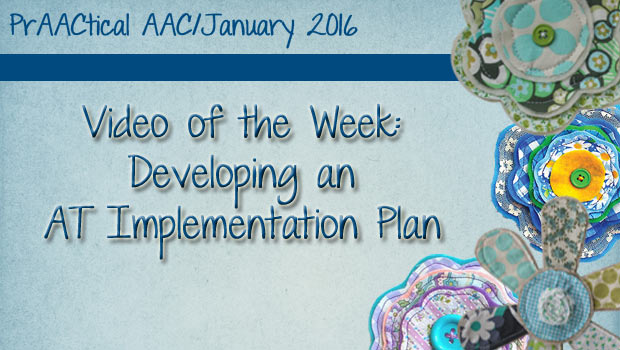
Gianna’s teacher uses a visual schedule app successfully in the classroom to support comprehension and reduce problem behaviors. Although she’s shared the strategy and the app with the SLP and OT, neither one consistently use the visual schedule app in their sessions with this student. Jordan’s SLP does her best to use aided language input to provide a competent model of linguistic expression using his SGD when she pushes in to provide services in the classroom. Once she’s gone, classroom staff rarely implement that strategy or create opportunities for Jordan to use the SGD at other times during the school day. Evan’s parents have made an enormous investment in learning about AAC and modeling core words at home to help their son develop stronger skills with his AAC app. They do their best to follow along with the Year of Core Vocabulary Words approach, and are understandably dismayed when the... [Read More...]
January 3, 2016
by Carole Zangari -
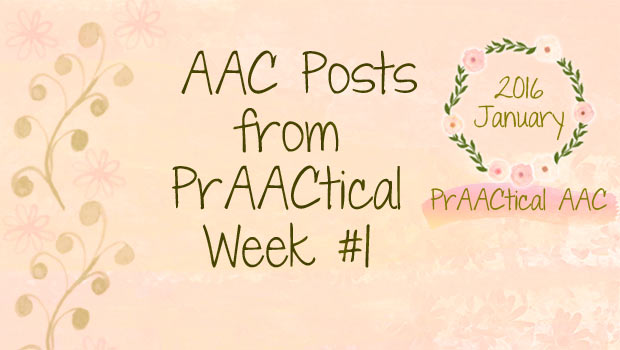
The New Year is a perfect time to give your clinical and educational practices a boost of AAC. Here are some posts from the week to get you started. Monday – Ready/Not Ready: 5 Visual Supports for AAC Learners Tuesday – PrAACtically January: Resources for A Year of Core Vocabulary Words Wednesday – Video of the Week: Using Structure to Minimize Behavioral Challenges Thursday – The Most Popular AAC Posts of 2015 Thanks for all you do to support children and adults with little or no functional speech.









